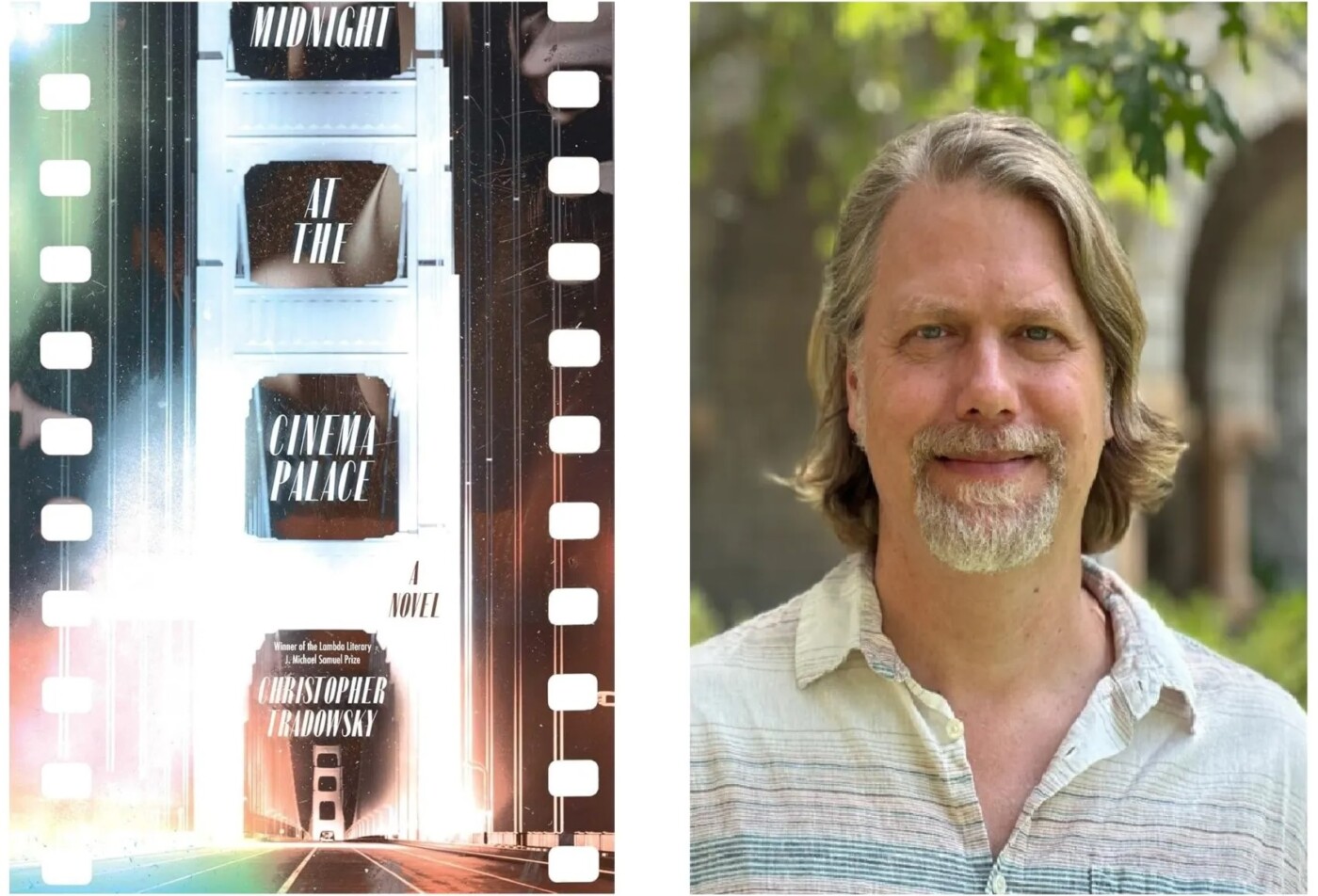Christopher Tradowsky’s debut novel is a story of friendship, cinephilia and norm-defying ways of loving set in the intoxicating world of 1990s San Francisco.
“A book about joy,” is how Tradowsky, an award-winning writer of short fiction, describes “Midnight at the Cinema Palace” (Simon & Schuster, 400 pages, $28.99, June 10, 2025).
The breezy, busy novel was inspired by Tradowsky’s own transformation moving to San Francisco and coming alive after exiting the closet.
“I lived in San Francisco from 1992 to 2000, and the novel is taken from a lot of my experiences there,” says the St. Paul–based university educator and art historian, who will read from the book on June 21 at Queer Arts Featured, the storefront that once housed Harvey Milk’s camera store.
The book revisits those years—days of gay liberation and free-flowing humanity, with the digital revolution on the horizon about to change everything.
The story begins when Walter Simmering, an academically inclined young Midwesterner arrives in San Francisco, where “you can be gay and not have to think about it,” he’s been told.
Walter is smitten with creative and romantic partners Sasha and Cary — a male “gamine” and a “female dandy,” respectively. Sasha and Cary have day jobs, a nightclub singing act, killer fashion senses and an open-mindedness that both confounds and delights Walter.
“We must be the only species in the universe dumb enough to get hung up on some inverted nonsense called gender roles,” Cary says.
The three bond over love for San Francisco and old Hollywood. They see films together and cherish movie palaces like the Castro Theatre.
In passages that tickle film lovers, they evaluate what they’ve seen.
“Jules and Jim” is “positively electric with New Wave breeziness,” but it’s not the big deal it’s cracked up to be,” they say; “Sunset Boulevard” is “overrated,” says Sasha, and Gloria Swanson is “hammy.” They call “Christmas in Connecticut” a “boring screwball comedy.”
Their remarks “were pretty much me talking; that was part of the fun of it,” Tradowsky says.
Tradowsky describes the book as a “celebration of old movie houses.” One of his favorites is San Francisco’s former Alhambra theater on Polk Street.
Cary and Walter begin cowriting a screenplay, a sci-fi noir thriller set during the Red Scare and Lavender Scare period.
Walter soon becomes romantically involved with Cary and Sasha, ditching his conventional views of sex and relationships. The duo becomes a trio. They hang out, go clubbing, and make art together, too absorbed in their bubble to realize that the world they adore is disappearing.
Additional characters include Fiona, Walter’s hip roommate, and Jeff, a computer nerd. Lawrence is a former child actor and an experimental filmmaker living with AIDS.
Tradowsky doesn’t ignore AIDS, an element in Lawrence’s story. At the same time, he doesn’t dwell on the subject.
Despite the fear surrounding AIDS, Tradowsky says, for many LGBTQ+ people, the 1990s were a time of jubilation, stemming from newfound freedom.
“I wanted to look back and celebrate this moment in San Francisco that I thought was so magical,” says Tradowsky, noting, “Walter’s perspective is pretty close to mine.”
“I want people to be immersed sensorially and transported to a time and place,” he continues, describing the book’s depiction of San Francisco, which includes everything from Halloween in the Castro to Ton Kiang dim sum, to the checkerboard floor at Bimbo’s 365 Club.
Tradowsky, whose favorite author is Virginia Woolf and favorite literary character is Woolf’s Orlando (an Elizabethan nobleman who lives into modern times and becomes a woman), calls Cary and Sasha “my two Orlandos” in the book’s introduction.
He adds, “One of my roles as a teacher is to demonstrate my feeling that there is continuity to the questions we have today about gender identity and sexuality.”
Mentioning that the current government’s assault on transgender rights makes him “heartsick,” he continues, “I’m trying to make a contribution to celebrating gender nonconformity.
“I have to remind myself that there is space for a novel that’s about joy. It’s not just frivolous. It’s absolutely necessary.”
Christopher Tradowsky appears at 7 p.m. June 21 at Queer Arts Featured, 575 Castro St. San Francisco. Visit eventbrite.com.
The post ‘Midnight at the Cinema Palace’ celebrates 1990s San Francisco in all its glory appeared first on Local News Matters.
